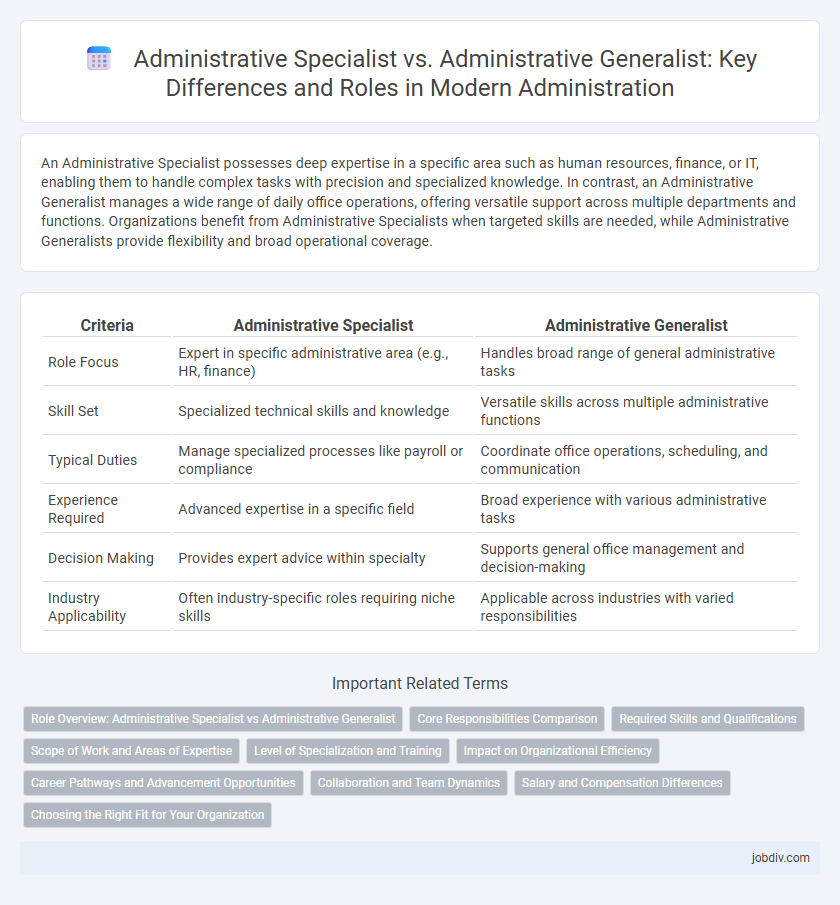An Administrative Specialist possesses deep expertise in a specific area such as human resources, finance, or IT, enabling them to handle complex tasks with precision and specialized knowledge. In contrast, an Administrative Generalist manages a wide range of daily office operations, offering versatile support across multiple departments and functions. Organizations benefit from Administrative Specialists when targeted skills are needed, while Administrative Generalists provide flexibility and broad operational coverage.
Table of Comparison
| Criteria | Administrative Specialist | Administrative Generalist |
|---|---|---|
| Role Focus | Expert in specific administrative area (e.g., HR, finance) | Handles broad range of general administrative tasks |
| Skill Set | Specialized technical skills and knowledge | Versatile skills across multiple administrative functions |
| Typical Duties | Manage specialized processes like payroll or compliance | Coordinate office operations, scheduling, and communication |
| Experience Required | Advanced expertise in a specific field | Broad experience with various administrative tasks |
| Decision Making | Provides expert advice within specialty | Supports general office management and decision-making |
| Industry Applicability | Often industry-specific roles requiring niche skills | Applicable across industries with varied responsibilities |
Role Overview: Administrative Specialist vs Administrative Generalist
An Administrative Specialist focuses on specific tasks such as data management, scheduling, or specialized software use, requiring in-depth expertise within a particular domain. In contrast, an Administrative Generalist handles a broad range of office duties including filing, correspondence, and customer service, providing versatile support across multiple departments. The Specialist role demands targeted skills and technical proficiency, while the Generalist emphasizes adaptability and comprehensive administrative capabilities.
Core Responsibilities Comparison
Administrative Specialists focus on specific tasks such as data management, scheduling, and specialized software use, optimizing efficiency within targeted functions. Administrative Generalists handle a broader range of tasks, including office coordination, communication, and basic bookkeeping, providing flexible support across various departments. The Specialist's role demands deep expertise in particular areas, while the Generalist requires a versatile skill set to manage diverse administrative duties.
Required Skills and Qualifications
Administrative Specialists require advanced proficiency in specific software tools such as Microsoft Excel, project management platforms, and industry-specific applications, alongside strong analytical and technical skills. Administrative Generalists possess a broader skill set, including effective communication, multitasking, time management, and basic proficiency in office software like Microsoft Office Suite. Both roles typically demand a high school diploma or associate degree, with specialists often needing additional certifications or specialized training relevant to their field.
Scope of Work and Areas of Expertise
An Administrative Specialist typically focuses on a specific domain such as payroll, records management, or executive support, offering in-depth expertise and handling complex tasks within that niche. In contrast, an Administrative Generalist manages a broader range of duties including scheduling, communication, office management, and basic bookkeeping, providing versatile support across multiple administrative functions. The scope of work for specialists is narrower but deeper, while generalists cover a wider array of responsibilities with a more generalized skill set.
Level of Specialization and Training
Administrative Specialists possess focused training and expertise in a specific area such as payroll, human resources, or compliance, enabling them to handle complex and technical tasks with precision. Administrative Generalists have broader training across multiple administrative functions, offering versatile support but with less depth in any single specialty. The level of specialization directly impacts the complexity of responsibilities and potential for advanced problem-solving within administrative roles.
Impact on Organizational Efficiency
Administrative Specialists bring expertise in specific functions like HR, finance, or IT, streamlining complex processes and improving accuracy within departments. Administrative Generalists handle diverse tasks across multiple areas, enhancing overall workflow flexibility and supporting cross-functional collaboration. Together, these roles boost organizational efficiency by balancing specialized knowledge with broad operational support.
Career Pathways and Advancement Opportunities
Administrative Specialists typically focus on a niche area such as HR, finance, or project coordination, offering deeper expertise and often faster advancement within specialized departments. Administrative Generalists handle a broad range of office tasks, providing flexibility and the ability to transition across various industries, which can lead to diverse career pathways but may require additional training for advancement. Career progression for specialists often includes roles like Office Manager or Department Coordinator, while generalists can advance to Operations Manager or Executive Assistant positions with broader organizational responsibilities.
Collaboration and Team Dynamics
Administrative Specialists excel in focused, role-specific tasks, enhancing collaboration by providing expert knowledge that supports team objectives. Administrative Generalists contribute to team dynamics by managing a broad range of administrative functions, fostering flexibility and seamless communication across departments. Effective collaboration relies on balancing specialist expertise with generalist adaptability to optimize workflow and achieve organizational goals.
Salary and Compensation Differences
Administrative Specialists typically earn higher salaries due to their focused expertise in areas such as payroll, compliance, or project management, often ranging from $45,000 to $65,000 annually. Administrative Generalists have broader but less specialized skill sets, with average salaries usually between $40,000 and $55,000, reflecting their versatile roles in office support. Compensation differences also arise from industry, geographic location, and experience levels, with specialists commanding premium pay in sectors requiring technical proficiency.
Choosing the Right Fit for Your Organization
An Administrative Specialist delivers focused expertise in specific areas like data management or executive support, enhancing efficiency in complex organizational tasks. In contrast, an Administrative Generalist manages a broad range of duties including scheduling, communication, and office coordination, providing flexibility across multiple functions. Selecting the right fit depends on the organization's needs for specialization versus versatility to optimize administrative operations.
Administrative Specialist vs Administrative Generalist Infographic

 jobdiv.com
jobdiv.com